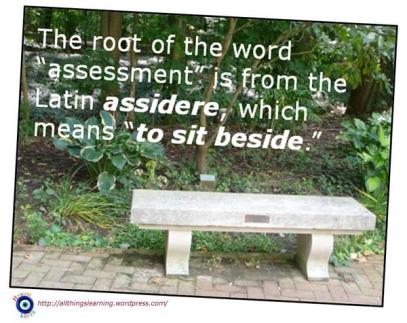A few years ago I had the opportunity to listen to Damian Cooper (expert on assessment and evaluation here in Ontario) give a talk at OAME. He shared an analogy with us that I found particularly interesting. He talked about the Olympic athletes that had just competed in Sochi, specifically ice skaters.
He asked us, who we thought made the biggest difference in the skaters’ careers: The scoring judges or their coaches they had throughout their careers?
Think about this for a second, an ice skater trying to become the best at their sport has many influences in their life. But who makes the biggest difference? Who helps them become the top athletes in their field? The scoring judges along the way, or their coaches? Or is it a mix of both???Damian gave us some time to think and then told us something like this (I’m paraphrasing here):
The scoring judge tells the skater how well they did, however, the skater already knows if they did well or not. The scoring judge just CONFIRMS if they did well or not. In fact, many skaters might be turned off of skating because of low scores! The scoring judge is about COMPETITION. Being accurate about the right score is their goal.
On the other hand, the coach’s role is only to help their skater improve. They watch, give feedback, ask them to repeat necessary steps… The coach knows exactly what you are good at, and where you need help. They know what to say when you do well, and how to get you to pick yourself up when you fall. Their goal is for you to become the very best you can be! They want you to succeed!
Thinking about this analogy, I can’t help but wonder how we might reflect on our own practices. In the everyday busyness of teaching, I think we often confuse the terms “assessment” with “evaluation”. Evaluating is about marking, levelling, grading. Any time we put a check on a question, a mark on the top of a page, or a grade or level on an assignment we are evaluating our students’ work.
On the other hand, assessing is actually something quite different. The term “assess” comes from the Latin “assidere” which translates as “to sit beside”. Assessment is kind of like learning about our students’ thinking processes, seeing how deeply they understand something. It is a process where we observe our students in action to understand their thought process, consider what a student was thinking when looking at an assignment, listen carefully to students’ reasoning as they share with us and others. Assessment, while related to evaluation, are very different processes!

I have shared this analogy with a lot of teachers in a number of settings because I think it is helpful for us to consider our role in the classroom. Are we handing out assignments and marking them (like a scoring judge), or are we providing opportunities for our students to learn, then observing them and really considering what we need to do next? While most agree with the premise of the coach having a bigger impact, many of us recognize that our job requires us to be the scoring judges too. While I understand the reality of our roles and responsibilities as teachers, I believe that if we want to make a difference, we need to be focusing on the right things. Take a look at Marian Small’s explanation of this below. I wonder if the focus in our schools is on the “big” stuff, or the “little” stuff? Take a look:
Marian Small – It’s About Learning

Thinking again to Damian’s analogy of the ice skaters, I can’t help but think about one issue that wasn’t discussed. We talked about what made the best skaters, even better, but I often spend much of my thoughts with those who struggle. Most of our classrooms have a mix of students who are motivated to do well, and those who either don’t believe they can be successful, or aren’t as motivated to achieve.
If we focus our attention on scoring, rating, judging – basically providing tasks and then marking them – I believe we will likely be sending our struggling students messages that math isn’t for them. On the other hand, if we focus on providing experiences where our students can learn, and we can observe them as they learn, then use our assessments to provide feedback or know which experiences we need to do next, we will send messages to our students that we can all improve.
Hopefully this sounds a lot like the Growth Mindset messages you have been hearing about!
Jo Boaler – Assessments for Learning Encourage a Growth Mindset

Take a quick look at the video above where Jo Boaler shows us the results of a study comparing marks vs feedback vs marks & feedback.
As usual, I leave you with a few questions to reflect on:
- Are you assessing or evaluating most of the time? Can you see the difference?
- Do your students see you as their coach or as a scoring judge?
- How do you provide your students with the feedback they need to learn and grow?
- How do you provide opportunities for your students to try things, to explore, make sense of things in an environment that is about learning, not performing?
- What does it mean for you to provide feedback? Is it only written?
- How can we capitalize on using various students’ thinking to help each other improve?
- How do you use these learning opportunities to provide feedback on your own teaching?
Let’s continue the conversation here or on Twitter!
3 thoughts on “Who Makes the Biggest Difference?”